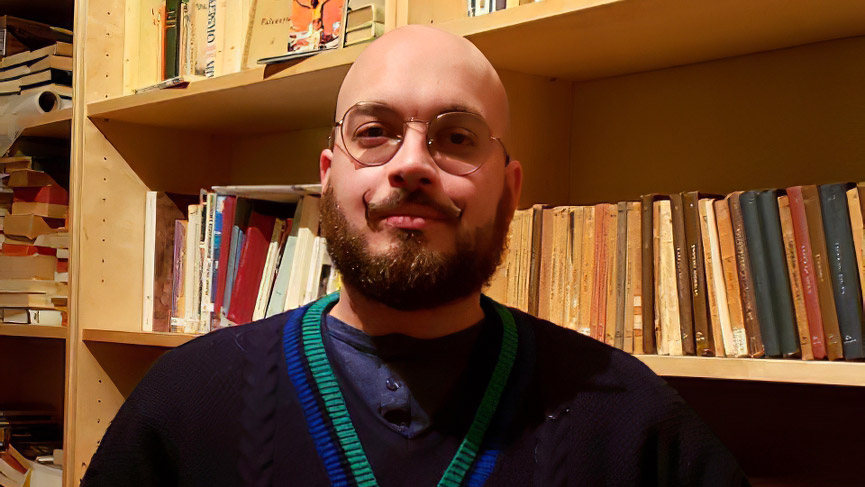Diego Saavedra Renaud : the Church responds at the grassroots

Montreal
During this time of turmoil, when COVID-19 has transformed and exacerbated the challenges faced by the most vulnerable in society, the Church continues its outreach through its presence and efforts to respond to the needs of its time. To help uncover examples of such initiatives put in place throughout the diocese of Montreal, we have gathered the testimonies of people working at the grassroots level, giving of themselves with generosity and creativity during this time of crisis.
Diego Saavedra Renaud has served in social action ministry at local parishes in the Côtes-des-Neiges area for several years, namely Notre-Dames-des-Neiges, St. Kevin, Saint-Joseph de Mont-Royal and Saint-Antonin. The 33-year-old, like many of his fellow citizens, had found himself temporarily unemployed, but that did not impede him: "I am young, I am relatively healthy, and if I have the means to serve in this way, I will not stay at home playing video games and watching TV shows on Netflix while my fellow citizens are starving out there." In fact, during this time when demands on community organizations have increased, his role in social action ministry calls to him more than ever: "I did it because I wanted to do it, because for me it was like a continuation of my mandate."
“People were hungry”
In more specific terms, he explains that following consultation with Community Development Corporation of Côte-des-Neiges, of which he is a member, the priority at the time was to help ensure food security: "People were hungry," he says. He explained that the neighbourhood’s population is "quite fragile and there is a large population of migrants, either new arrivals or refugees, of which one or both spouses have lost their jobs." MultiCaf, a local community food bank, decided to distribute food baskets, and other local organizations, who had since needed to cease food distribution services to the public following the government's announced restrictions, joined in: "If people can no longer come to us, then let's go to people's homes," he said.
Saavedra Renaud is in charge of delivering the food baskets: "In the beginning, 300-700 baskets were distributed per week. Now it's 2500 baskets a week." So he delivers between 50 to 70 baskets every day. The rest of the time, he collaborates with other social action parish representatives whose parishes also have parishioners in need and do not know where to turn. He ensures that their names are added to the delivery lists.
Computers for everyone
Saavedra Renaud is also involved in another initiative that raises funds for the purchase of computers, to help provide support to the estimated "162 families" in the neighbourhood experiencing difficulty and have neither a home computer nor access to the Internet. This would allow children to continue "going to school" online and some parents to work remotely from home.
The Church serving on the street
All these initiatives are carried out in collaboration with the community, which comprises a fully-integrated structure, explained Saavedra Renaud. On a personal level, the call to "follow the example of Christ" is what motivates Saavedra Renaud, to put himself at the service of the people: "We don't know who we're going to deliver to. We have a list of addresses, we load the truck, we leave at 9 a.m. But one door out of two, people tell us: ‘God bless you, God keep you, we will pray for you’ [...] We feel the presence of God in the deeds that we do because people tell us they are happy."
"For me that's really what pastoral ministry means right now. To be of service and to listen. [...] I would say that [this time] is a good example for all Catholics [to] remember the very foundations of our mission which has always been to care for others. We have always been at the service of others," says Saavedra Renaud. He recognizes, however, that not all pastoral workers and volunteers have the opportunity to get involved, but he stresses the importance of all efforts. For Saavedra Renaud, even the "elderly neighbourhood priest" who commits himself to praying for them is important: "We have never needed one other so much," he concludes.
And what happens after all this?
"I think that honestly, as a church, at the end of this time of confinement, we can be proud. I'm proud of my church, I'm proud of my colleagues, and I'm proud to be a part of that," Saavedra Renaud said cheerfully. In his eyes, it is not about flaunting to the world, but rather of reminding the entire Christian community once it returns to Church: "Hey, look! During COVID, the message of Jesus was put into practice in a very concrete way. Now that it's over, well, let’s keep it going, because to me, the world after confinement, will be born to become something different," he says. He adds that this crisis will have brought to light "the limits of the State", because even if the State is doing a lot, it is evident to him that "the community associations, the churches, and the volunteers are the ones keeping the machine running at the moment."

Comment
Comment
Add new comment